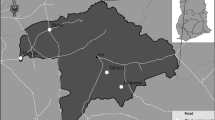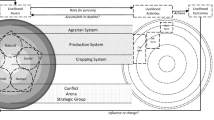Abstract
Güinope, Honduras was the site of a highly acclaimed people-centered development project in the 1980s. The ACORDE/Ministry of Natural Resource/World Neighbors Integrated Development Program (IDP) was unique for its time, since rather than relying on technology transfer, it promoted innovation skills for local generation of responses to needs. Furthermore, it was one of the first efforts in Latin America to employ villagers as principal agents of change. Fifteen years after the inception of the IDP and ten years after its completion, the authors interviewed farmers in their fields and held a series of participatory workshops over eighteen months with ten outstanding farmers who had become project leaders. The leaders identified influential factors behind their involvement and produced recommendations for rural development interventions. Further, a generalized concept map typifying ideal characteristics for farmer promoters was constructed. Recommendations for development agencies centered on project design and implementation, demanding a methodology for strengthening local innovative capacities, participation, and control over resources. Ultimately, the leaders downplayed the role of technologies in rural development and called for special attention to enabling communities to confront external pressures, in particular recent government ``modernization'' policies, that they felt threatened community livelihood.
Similar content being viewed by others
References
Boserup, E. (1965). The Conditions of Agricultural Growth: The Economics of Agrarian Change under Population Pressure. London: Allen and Unwin.
Bunch, R. (1983). Two Ears of Corn: A People's Guide to People-Centered Agriculture Improvement. Oklahoma City: World Neighbors.
Bunch, R. (1987). Case Study of Güinope Integrated Development Program, Güinope, Honduras. Paper presented at IIED Conference on Sustainable Development, London, 28–30 April.
Bunch, R. and G. López (1994). Soil Ecuperation in Central America: Measuring Impact 4 to 40 Years after Intervention. Honduras: COSECHA.
Campbell, B. M., P. Bradley, and S. E. Carter (1997). "Sustainability and peasant farming: Observations from Zimbabwe." Agriculture and Human Values 14: 159–168.
Chambers, R. (1983). Rural Development: Putting the Last First. New York: John Wiley and Sons.
Chambers, R., A. Pacey, and L. A. Thrupp (eds.) (1989). Farmer First. Farmer Innovation and Agricultural Research. London: Intermediate Technology Publications.
Cochran, W. (1976). Técnicas de muestreo (translated by E. C. Casas-Díaz), 6th edn. Mexico: Continental.
Colverson, K. (1996). Women's Access to Agriculture Information in Honduras. PhD thesis. Cornell University, Ithaca, New York.
de Fontenay, C. (1997). Market Power and Agro-Export Production in Northern Honduras. Doctoral dissertation, Department of Economics, Stanford University, California.
Hellin, J. and S. Larrea (1998). "Ecological and socio-economic reasons for the adoption and adaptation of live barriers in Güinope, Honduras," in H.-P. Blume, H. Eger, E. Fleischhauer, A. Hebel, C. Reij, and K. G. Stenier (eds.), Towards Sustainable Land Use: Furthering Cooperation between People and Institutions. Selected papers of the 9th conference of the International Soil Conservation Organization, Bonn, Germany, 26–30 August 1996. Advances in Geoecology 31: 1383–1388.
Kaimowitz, D. (1996). "La ganaderia hondureña: entre la esperanza de un crecimiento incluyente y sostenible y las amenazas del latifundio y la deforestación," in E. Baumesiter (coordinator), El agro hondureño y su futuro (pp. 169–204). Tegucigalpa, Honduras: Editorial Guaymuras.
Krishna, A. and R. Bunch (1997). "Farmer to farmer experimentation and extension: Integrated rural development for smallholders in Guatemala," in A. Krishna, N. Uphoff, and M. Esman (eds.), Reasons for Hope: Instructive Experiences in Rural Development (pp. 137–152). West Hartford, Connecticut: Kumarian Press.
Krishna, A., N. Uphoff, and M. Esman (1997). Reasons for Hope: Instructive Experiences in Rural Development. West Hartford, Connecticut: Kumarian Press.
Larrea, S. (1997). Experiencias y lecciones de agricultores innovadores sobre el desarrollo rural: Caso de Güinope, Honduras. BSc thesis. Pan American School of Agriculture, Zamorano, Honduras.
López, G., J. García, and R. Bunch (1996). Adopción de tecnologías de conservación de suelos y agua en el distrito de Güinope, El Paraíso. Honduras: COSECHA.
Mejia, F. (1993). Las actividades de conservación de suelos en las organizaciones privadas de desarrollo de Honduras. Tegucigalpa, Honduras: FOPRIDEH.
Pretty, J. (1995). Regenerating Aagriculture: Policies and Practices for Sustainability and Self-Reliance. London: Earthscan Publications.
Reijntjes, C., B. Haverkert, and A. Waters-Bayer (1995). Cultivando para el futuro: Introducción a la agricultura sustentable de bajos insumos externos. ILEIA.
Scarborough, V, S. Killough, D. A. Johnson, and J. Farrington (1997). Farmer-Led Extension: Concepts and Practices. London: Overseas Development Institute/Intermediate Technology Publications.
Scoones, I. and J. Thompson (eds.) (1994). Beyond Farmer First. London: Intermediate Technology Publications.
Selener, D. (1997). Participatory Action Research and Social Change. Ithaca, New York: The Cornell Participatory Action Research Network, Cornell University.
Selener, D., J. Chenier, and R. Zelaya (1997). Farmer-to-Farmer Extension: Practical Lessons from Central America. Quito, Ecuador: IIRR.
Shaxson, T. F. (1997)."Commentary: Conservation at the crossroads in tropical countries." Journal of the Soil and Water Conservation Society (January-February): 2.
Sherwood, S. G. (1997). "Politics of inequity: The impact of recent public policy changes on small-scale agriculture of the North Coast of Honduras (in Spanish)," in M. B. Flores (coordinator), The Use of Cover Crops in Central America. Case Study for the International Workshop on Smallholder Green Manure Cover Crop Systems of Tropical and Subtropical Regions. Santa Catarina, Brazil, 6–12 April: 40–46.
Smith, K. (1994). The Human Farm. A Tale of Changing Lives and Changing Lands. West Hartford, Connecticut: Kumarian Press.
Uphoff, N. (1992). Learning from Gal Oya. Possibilities for Participatory Development and Post-Newtonian Social Science. Ithaca, New York: Cornell University Press.
van Veldhuizen, L., A. Waters-Bayer, R. Ramírez, D. Johnson, and J. Thompson (eds.) (1997). Farmers' Research in Practice: Lesson from the Field. London: Intermediate Technology Publications.
Author information
Authors and Affiliations
Rights and permissions
About this article
Cite this article
Sherwood, S., Larrea, S. Looking back to see ahead: Farmer lessons and recommendations after 15 years of innovation and leadership in Güinope, Honduras. Agriculture and Human Values 18, 195–208 (2001). https://doi.org/10.1023/A:1011179710081
Issue Date:
DOI: https://doi.org/10.1023/A:1011179710081




